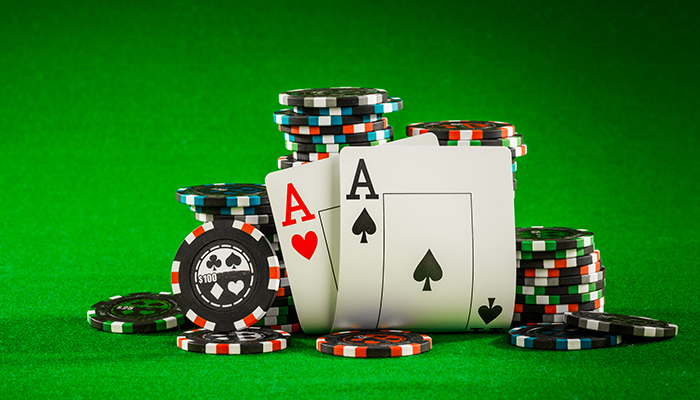How to Play Pocket Pairs?
 Pocket Pairs
Pocket Pairs
The cold hard fact is that whether you are playing NLHE at the Borgata at $10/$25, or a $1/$3 limit game at the newest at one of the newest online poker sites, you are only dealt pocket pairs slightly more than 5% of the time. You have to take this opportunity to ascertain whether you can use this pair to extract some money from the table. Still, like everything in poker, we must be aware of our position, what kind of pair we have, and be prepared to cut our losses should the flop come with straight, flush, or full house possibilities.
- How to Play Small and Medium Pocket Pairs in Poker
- How to Play Premium Pocket Pairs
- Pocket Pair Odds
- Conclusion
How to Play Small and Medium Pocket Pairs in Poker
We need to exploit these good hands as much as we can preflop, but we may be constrained by position or a lower pair than we would have liked. Also, we will play pairs differently in cash games than we would in a tourney situation.
Playing Pre-Flop Small Pair
We will only hit a set 10% of the time. That means that most small pairs should never be played when you are out of position. On a full table, when you are first to act or even second, you should throw away small pairs to conserve bankroll.
If we are acting a few more positions from the big blind, we might consider opening medium pocket pairs. Or if the table only has five or six players, maybe we can open with more small pairs. But in cash games, in general, stay away from all but the highest of the low pairs unless acting late.
In tournaments when we are extremely short-stacked, we may need to attempt to steal blinds when we are down under 30 big blinds left in our stacks. But this kind of shove is more desperation than deception since we can make more on the hands we hit with, say a set or two pair, than lose on the ones we miss.
Now, if we are on the big blind or the button, we should carefully weigh the action even with lower low pairs and even consider defending the blinds with an open raise.
Playing Medium Pair Pre-Flop
If you have a raise in front of you and are not on the button or big blind, you need to consider where that player is. Someone acting late and close to your right might give you a chance to play medium pairs and up. But against someone acting much earlier, you will probably want to lay all those low and medium pairs down.
And don’t even consider three betting low pocket pairs or defending them against a late call. Post-flop play of smaller pocket pairs is a bit outside the scope of this article, but know that if you didn’t flop the set or at least two pairs, you’re going to need to tread a bit more gently.
How to Play Premium Pocket Pairs
Let’s put some things to bed right away; we strongly believe that pocket tens are not a high pair and, therefore, are not a premium pair but more of a high medium pair. Playing premium pairs is about aggression. You have the advantage pre-flop, so act like it. Don’t get pushed off a premium pair post-flop because you limped in and let someone draw a low set on the flop.
This is especially true of a pair of jacks, which, yes, everyone hates, but you’re still a 77% favorite to win against anybody else preflop. Make the most of it. Push some people out of this hand. Heck, maybe even consider a raise if it’s a three-bet.
Post flop, of course, this hand does suck because it is hard to play. Depending on the potential of an overpair on the flop or a straight or flush draw, you will have some decisions to make. But it usually pays to stay aggressive, especially if you are pot-committed.
You peek your hand, and it’s pocket Queens. Finally, we are getting somewhere. But let’s get some value out of this great hand. We think you should be prepared to raise with pocket queens preflop. We think you should three and four bet with pocket queens, the exception being early position and facing a three-bet from either the small or big blinds, in which case a call may be warranted. Go ahead and take your shot. If someone four-bets your three-bet, the odds still favor you.
When you get dealt pocket kings, the last thing on your mind should be some kind sort of skillfully laid trap or even thinking the word call. Get seriously aggressive. Raise and maybe even consider reraising before the flop because the last thing you want is for some gut shot straight or flush to show up on the flop. If you’re not playing limit, maybe you think about pushing all in.
And you keep right on pushing after the flop, raise, reraise if you don’t go all in or are playing limit. If an ace comes on the flop, well, you know, then we have to step back and look at our options. And flops that have lots of straight and flush outs have to concern us, but that is why we should have pushed most of these people out before we got here.
Hallelujah! Pocket Aces, a hand so rare that we only see it every 220 hands. So, we have to make sure we get paid on this one. Please put all those Teddy KGB tricks out of your mind and press your opponents hard and for value. This isn’t Hollywood, and you aren’t John Malkovich.
Raise, three-bet, and squeeze if you must, but maybe don’t go out of your normal preflop raise range so you get some calls. If you’ve been three bet, then you consider four-bet or maybe push all in. You’ve got an 80% chance right now. Print some money. If it is a five-bet, well like everything in this game, it depends. If you have strong, rational players, maybe just call, but in lower-limit games against middling players, take the five bet or push all in.
We do not want to end up in multiway pots; they degrade our aces strong percentages quickly. Push people out post-flop, if possible. But remember, if a player represents a strong hand or a stronger draw in multiway pots, there is no harm in believing them. There is no shame in making a hero fold if you think your opponent has you beat, even when laying down a pair of aces.
Pocket Pair Odds
The range of pocket pairs is a problem. Yes, you only get dealt pocket pairs 6% of the time, but in a nine-handed game, the odds that your pair of twos are already beaten by a higher hand preflop are over 40%. The odds of your pair of kings not currently being the best hand on the board are less than 4%. So when we talk about pocket pairs, it is important to distinguish low pocket pairs, medium pocket pairs, and premium pocket pairs.
Some other interesting pocket pair odds include those pesky pairs of Jacks or walking sticks. The reason they are so hard to play post-flop is that a higher card will hit the board slightly more than half the time.
When you’ve got pocket rockets in your hand on a full table, your odds of winning that actual pot are about a third, but if you get it down to two callers, everything else being equal, you will win about75% of all hands, and 85% of all hands if you only have one caller.
If you’ve got cowboys, you are in great shape, but you have to have that worry about an Ace/King hand being out there somewhere. Relax, you have a 70% advantage preflop, and that second ace hitting the board only happens one in five times.
Conclusion
Learning how to play pocket pairs is a fundamental part of your poker game, even though they are not frequent. These hands can allow you to extract value from other players but also cause you great grief if you overplay them, especially medium-pocket pairs.
If you have Aces, Kings, or Queens as your pocket pair get aggressive. If you have jacks, tens, or even nines, evaluate your position, opponents, and bankroll before proceeding.
Lower poker hands should seldom get a three call, and anything else will have to be determined by your position and the type of player you are playing with.




